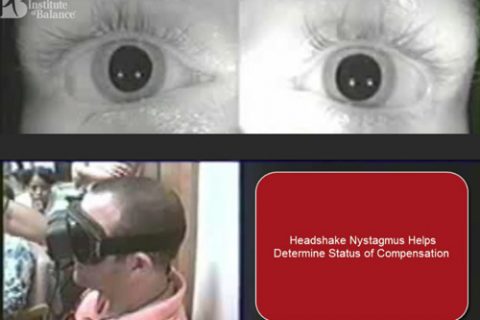
VIDEO: Headshake Nystagmus Helps Determine Status of Compensation
Published on: July 17, 2013
The introduction of a headshake protocol within a bedside examination or VNG is often useful in revealing an active or yet uncompensated vestibulopathy within the frequency of the VOR. The protocol is performed with the patient seated, however its sensitivity will be enhanced when performed in a lateral body position. The caveat is that the patient must be in a vision-denied condition to ensure absence of a visual suppression effect, requiring VOG or VNG video-goggle. Frenzels will not provide this, as the patient can easily see the insides of the goggle.
As can be seen in this video case study, the post head shake nystagmus beats away (slow phase) from the impaired end-organ with the fast phase towards the intact labyrinth (Ewald’s 2nd Law). This is the most common pattern, but a recovery nystagmus may show a reversal of this pattern. Numerous investigators have reported a sensitivity of as high as 95%, but with somewhat poor specificity (49%).
The presence of the nystagmus is a clear indication that the patient is an uncompensated state and an ideal candidate for Vestibular Rehabilitation. This may be further correlated with other function tests such as CTSIB, Dynamic Visual Acuity, etc.
Recent Posts
Comparison between Epley and Gans Repositioning Maneuvers for Posterior Canal BPPV: A Randomized Controlled Trial
Published on: March 26, 2024
Annals of Indian Academy of Neurology | Volume 26 – Issue 4 – July-August 2023 Benign paroxysmal positional vertigo (BPPV) is one of the commonly occurring causes of vertigo. BPPV […]
Read more
How to evaluate and treat the dizzy patient: non-medical diagnosis-based strategies
Published on: February 16, 2024
ENT & Audiology News | Balance & Vestibular Disorders 2024 It is estimated that dizziness, vertigo and falls are the third most common complaints heard by physicians from all age […]
Read more
The cost of untreated vestibular conditions: the role of otolaryngology & rehabilitation
Published on: February 15, 2024
Journal of Otolaryngology-ENT Research | Volume 16 Issue 1 – 2024 It is estimated that dizziness, vertigo, and falls are the third most common complaints heard by physicians from all […]
Read more
Understanding Mal de Debarquement syndrome (MdDS), persistent postural perceptual dizziness (3PD) and somatoform disorders: and the role of vestibular rehabilitation therapy (VRT)
Published on: January 3, 2024
Volume 16 Issue 1 – 2024 Richard E Gans, Kimberly Rutherford, Allisson D’Alessandro American Institute of Balance, USA Correspondence: Richard E Gans, Founder and Executive Director of the American Institute […]
Read more
